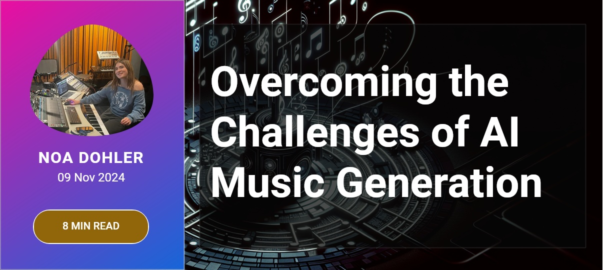AI Music Tech revolutionizes creativity, but challenges remain.
The intersection of artificial intelligence and music creation is transforming how we compose, produce, and experience music. While AI-generated music applications continue to evolve, understanding their limitations and potential is crucial for musicians and technologists alike.
As a composer, I recently experimented with an AI music generator for a film score. While it provided interesting melodic suggestions, the emotional nuances I needed required significant human intervention. It was both fascinating and humbling to see where AI excelled and where it fell short.
Current Limitations in AI Music Generation
The challenges facing AI Music Tech are multifaceted and complex. According to recent research, while AI can effectively replicate existing musical styles, it struggles with creating truly original compositions that resonate emotionally with listeners. The technology often produces predictable patterns and lacks the subtle variations that make human compositions unique.
Complex musical structures pose another significant hurdle. AI systems frequently struggle with maintaining coherent long-form compositions, often losing structural integrity beyond short segments. This limitation becomes particularly evident in genres requiring intricate arrangements or elaborate harmonic progressions.
The question of originality remains a central concern. While AI can analyze and mimic existing styles, its capacity for genuine innovation is constrained by its training data. This dependency on pre-existing works raises both technical and ethical questions about the nature of creativity and artistic authenticity in AI-generated music.
Human-AI Collaboration in Music Creation
The future of AI Music Tech lies in effective human-AI collaboration. When properly guided by human expertise, AI tools can augment creative processes without replacing human intuition. Industry analysis shows the AI music generation market growing at an impressive 41.89% CAGR, projected to reach $1.10 billion by 2027.
Musicians and producers are finding innovative ways to integrate AI into their workflows. By using AI for initial ideation and basic pattern generation, artists can focus more on refinement and emotional expression. This symbiotic relationship allows for faster creation while maintaining artistic integrity.
The role of human input becomes crucial in ensuring musical coherence and emotional depth. Musicians can guide AI systems toward more nuanced compositions by providing specific parameters and creative direction, resulting in more sophisticated and personally resonant musical pieces.
Technological Breakthroughs in AI Music Generation
Recent advances in deep learning algorithms are revolutionizing AI Music Tech capabilities. New research in AI-based affective music generation shows promising developments in creating emotionally intelligent compositions. These systems are becoming increasingly sophisticated in understanding musical theory and structure.
Enhanced datasets and training methodologies are improving AI’s ability to generate authentic-sounding music. By incorporating more diverse musical examples and cultural contexts, AI systems are developing a broader understanding of different genres and styles, leading to more versatile and sophisticated outputs.
Machine learning architectures are evolving to better capture the nuances of musical composition. New models can now process longer sequences of music, maintain thematic consistency, and generate more coherent arrangements, addressing some of the fundamental limitations of earlier systems.
Future Integration of AI and Human Artistry
The evolution of AI Music Tech is steering toward a balanced future where technology enhances rather than replaces human creativity. MIT’s research emphasizes the importance of interdisciplinary collaboration in advancing AI music generation while preserving artistic integrity.
Industry experts predict a transformation in music education and production workflows. AI tools will likely become standard in music production suites, offering intelligent assistance while leaving crucial creative decisions to human artists. This integration will democratize music creation while maintaining the irreplaceable value of human creativity.
The key to successful integration lies in developing frameworks that preserve artistic authenticity. As AI capabilities expand, the focus shifts to creating systems that complement human creativity rather than compete with it, ensuring that technology serves as an enabler of artistic expression.
Innovation Opportunities in AI Music Creation
Startups could develop AI-powered collaborative platforms that connect musicians globally, enabling real-time composition with AI assistance. Such platforms could facilitate cross-cultural musical fusion, potentially creating new genres and expanding creative possibilities for artists worldwide.
Large corporations could invest in AI-driven music education systems that adapt to individual learning styles. These systems could analyze student performance in real-time, providing personalized feedback and generating custom exercises, potentially revolutionizing music education with a market value exceeding $500 million by 2025.
There’s potential for developing AI-powered music therapy applications that generate personalized therapeutic compositions. This could create a new market segment worth $200 million annually, combining mental health benefits with musical innovation while providing new revenue streams for both healthcare providers and musicians.
Embrace the Musical Evolution
The journey of AI Music Tech is just beginning, and its potential is boundless. Whether you’re a musician, producer, or technology enthusiast, now is the time to explore these emerging possibilities. How will you contribute to this exciting fusion of technology and artistry? Share your thoughts and experiences, and let’s shape the future of music together.
Essential FAQ About AI Music Tech
Q: How accurate is AI in replicating human musical creativity?
A: While AI can effectively mimic existing styles, it currently struggles with creating original, emotionally resonant compositions that match human creativity.
Q: What is the market size for AI music technology?
A: The AI music generation market is growing at a CAGR of 41.89% and is projected to reach $1.10 billion by 2027.
Q: Can AI completely replace human musicians?
A: No, AI is designed to complement rather than replace human musicians, serving as a tool to enhance creativity and streamline production processes.
